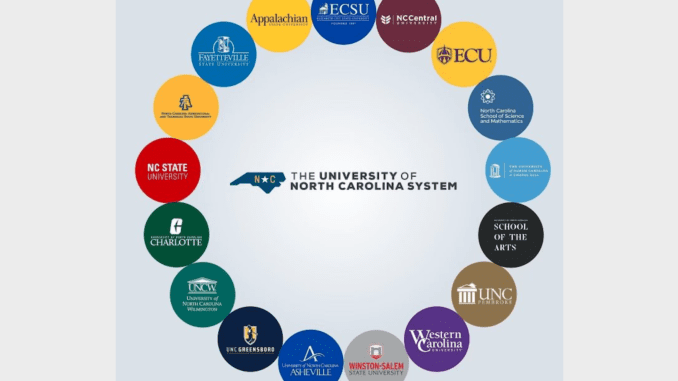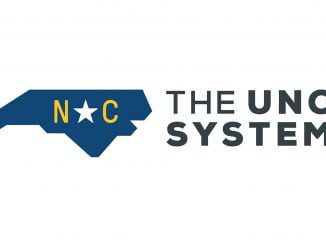
RALEIGH — A University of North Carolina Board of Governors committee recently issued a report on the Return on Investment (ROI) for students enrolled in the system’s programs.
The 80-page ROI report was presented by the University of North Carolina Board of Governors’ Committee on Educational Planning, Policies, and Programs’ Committee on Strategic Initiatives and was discussed by the UNC System Board of Governors at its most recent meeting held Nov. 15.
Deloitte, rpk GROUP and The Burning Glass Institute were the entities producing the research for the report.
Several years ago, the General Assembly directed the UNC Board of Governors (BOG) to contract with an independent consultant to evaluate current programs at each UNC institution with regard to operational costs, student outcomes, and ROI of each program. The report is headed to the legislature for review.
The study conducted ROI calculations for 765 undergraduate and 599 graduate programs in the UNC System between 2015 and 2020. It compared the expected lifetime earnings of UNC graduates against those without a college degree (for undergraduates) or with a bachelor’s degree (for graduates) using the American Community Survey.
Per the report, the median incremental lifetime ROI for undergraduates came out at $494,091, while for graduates, it landed at $930,515.
Deloitte’s Peter Fritz described the report’s findings as akin to receiving “a check for $500,000” upon graduation from the program.
In terms of state spending, for every dollar the state invests in the UNC system, students can expect an additional $23 in lifetime earnings.
Overall, 93% of the 1,364 programs examined had a positive ROI, with 94% of undergrad and 91% of graduate programs showing positive returns, according to the report.
Among graduate programs, 68% provided a median lifetime ROI greater than $500,000.
Graduates from 42 undergraduate and 83 graduate programs earned a median lifetime ROI greater than $1M, many aligning with critical workforce needs in the state. Programs with returns exceeding $1M that are no longer active are excluded from the detailed tables.
Other findings included 96% of Health Professions and Related programs of study provided a positive ROI for students at both undergraduate and graduate levels and “significant upward mobility” was observed across the various schools and programs offered with 89.6% of low-income graduates moving up at least one income band as their careers progress.
The highest returns were found in science, technology, engineering, and mathematics (STEM) fields. Biotechnology degrees were identified as the most lucrative, with a median lifetime return exceeding $3.2 million.
Programs mitigating the costs of attending UNC System Schools received praise in the ROI report.
“The system, through support from the legislature and under the leadership of President Peter Hans, has built robust programs such as the NC Promise and the Fixed Tuition Program that increase educational access, reduce student debt, and ultimately boost the State’s economy,” the report says.
Current undergraduate tuition, including fees, across the 16 schools in the UNC System for in-state residents can range from a low of $3,391 a year (Elizabeth City) to a high of $9,006 (UNC School of the Arts). Out-of-state undergraduate tuition, including fees, has a low end of $7,391 (Elizabeth City) and a high end of $39,092 (UNC Chapel Hill).
Similarly, the lowest tuition and fee rates for in-state graduate students is currently $5,766 at year (Elizabeth City) and the highest comes in at $12,262 (UNC Chapel Hill). For out-of-state graduate students, the lowest is $18,828 (Elizabeth City) and the highest is $30,554 (UNC Chapel Hill).
Elizabeth City’s rate remains the lowest for both graduate and undergraduate because it is one of four UNC System schools currently part of the NC Promise Tuition Plan created by the legislature in 2016. The plan’s tuition rates for in-state students is $500 a semester and out-of-state students pay $2,500 each semester.
When compared to the national average for in-state undergraduate tuition costs at public universities of around $10,622, most UNC System schools end up being cheaper. Nationally, graduate student program tuition is steeper, with full-time two-year graduate degrees often costing over $100,000 or even more if one pursues a doctorate.
“The dashboards are meant to be used as living tools that the General Assembly can use to help spark data-informed conversations with both the System Office and the constituent universities that make up the University of North Carolina and have limited value in isolation without institutional context and conversation,” the report’s conclusion states.
The conclusion also said the various data dashboards in the report were essentially a jumping-off point, that the data would need to be refreshed, and offered suggestions for keeping the data current.
Limitations with the report data were noted, including the absence of wage data for students who earn degrees in the UNC System but pursue careers in other states.
The ROI report comes at a time when U.S. corporations are dropping bachelor’s degree requirements for employment.
Per a November 2023 survey of 800 employers in the U.S. conducted by Intelligent.com, 55% of companies have already cut bachelor’s degree requirements in 2023.
Big names in business like IBM, Bank of America, Wal-Mart, and even Google have already announced similar changes.
Another 45% of companies said they plan to eliminate those degree requirements for some positions in 2024.
The survey’s findings also showed 70% of companies say they eliminated bachelor’s degree requirements to create “a more diverse workforce,” and that four out of five employers value experience over education when evaluating job candidates.


